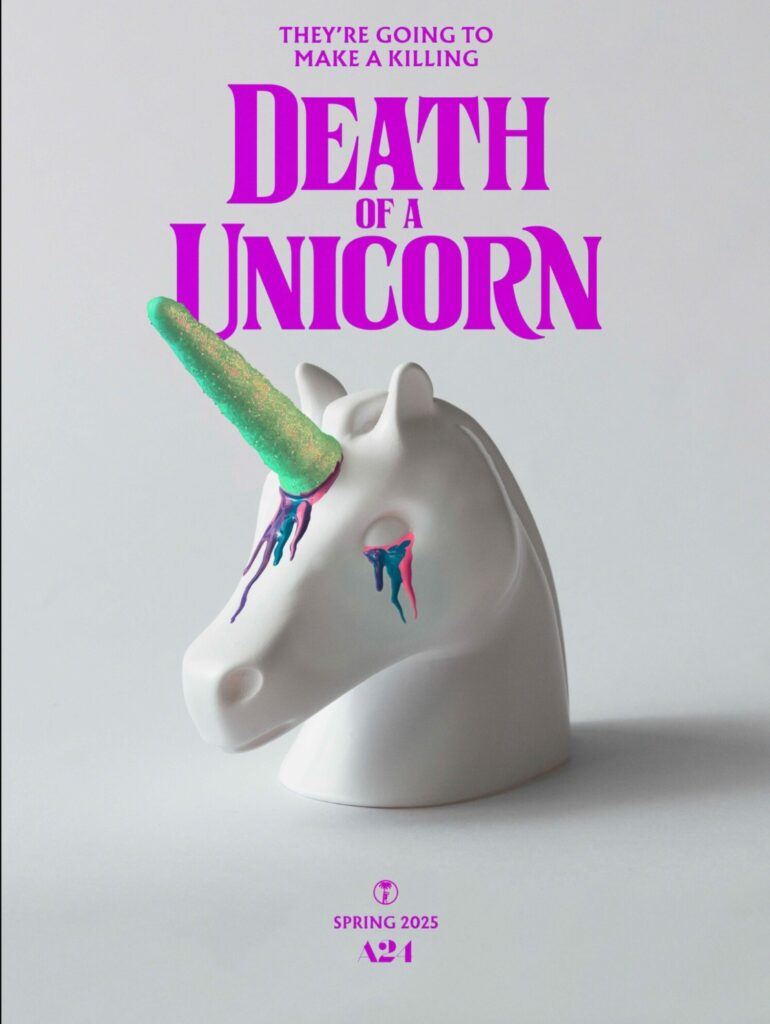
Sometimes the world breaks open not with a whisper, but with the crash of something sacred. Death of a Unicorn is such a film—a story where accident meets myth, where tragedy opens doors to revelation, where the clash of human ambition and otherworldly grace forces us to reckon with what we think we know.
The Accident as Oracle
Elliot Kintner (Paul Rudd) and his daughter Ridley (Jenna Ortega) begin in grief and in ordinary human frailties—loss, allergies, acne, the mundane wounds of life. They hurt. They are fallible. Then, in one luminous, horrible instant on a winding forest road, they strike a unicorn foal. That accident becomes oracle: a rupture in the ordinary where miracles, and monstrosity, bleed together.
The film suggests intelligence isn’t simply a measure of what we can know, but also what we refuse to see. Elliot hides the unicorn, tries to kill its suffering, then realizes its blood has strange curative power—his allergies vanish, Ridley’s skin clears. Intelligence, in Death of a Unicorn, demands humility. It insists that sometimes a miracle is not a cure, but a question.
Miracles: Not Free but Price-Tagged
The unicorn’s healing isn’t just magical—it becomes marketable. Odell Leopold and his family (the ultra-wealthy) see in the creature not wonder, but profit; not sanctity, but a commodity. The horn becomes a medical panacea, the myth a laboratory specimen.
Here, the film draws a fault line: intelligence corrupted by greed. The more humans try to control or own the miraculous, the more the miraculous fights back. Parent unicorns, aligned with mythic justice, erupt in violence. In Death of a Unicorn, miracles are not cheap gifts—they are summons to moral reckoning.
Knowledge, Ignorance, and the Cost of Seeing
Ridley, teenage, cynical, and smart, becomes the moral compass. She reads The Unicorn Tapestries, she feels the weight of legends. Her intelligence isn’t forensic—it is sensitive to wonder, uncomfortable with the idea that what is miraculous must be dissected. She points out that treating a unicorn like a medical cartridge erases its mystery.
Elliot, her father, stands at the crossroad between complicity and sacrifice. Initially tempted by promises of success, he is dragged into the moral fog of scientific exploitation. His intelligence is pragmatic—but it must be redeemed through loss. Only when he puts Ridley’s safety, the unicorn’s integrity, and compassion above profit does something transcendent happen.
Miracles as Justice, Intelligence as Sacrifice
The climax is mythic. Elliot’s choices—his act of stabbing the exploitative son with the unicorn’s horn, confronting violence not with calculation but urgency—set in motion a reckoning. Miracles happen not because characters earn them, but because love, fear, grief, and ethical clarity push them into moments of radical vulnerability. The parent unicorns resurrect Elliot, partially, because of Ridley’s empathy and the courage to see beyond human dominion. Forgiveness, transcendence, resurrection—these miracles are seldom granted; they are earned through the sacrifice of certainty.
Between Intelligence and Wonder
The film keeps pulling us back to a tension: science vs myth; knowing vs believing. The Leopolds represent the ambition to “know all”—to exploit, to dissect, to own every magical power. The unicorns, on the other hand, represent mystery, a force that is partly vengeful, partly gracious. It’s not a simple duel—they are intertwined.
We are left asking: what is intelligence without wonder? What does it cost to lose the miraculous? And conversely, what responsibilities accompany wonder?
Conclusion: The Luminous Aftershock
Death of a Unicorn leaves its audience in the twilight between what was and what could be. After the gory chaos, after the betrayal, after the miraculous healing, there is still memory. There is awe. There is mourning.
It asks us: If we encountered something wholly other—something we cannot own, something sacred—would we kill it for profit, or protect it for meaning? If intelligence demands sacrifices, would we choose them?
In the end, the unicorns return to their wilderness—but the humans are changed. Miracles are not fairy tales. They are disruptions. And intelligence, at its best, does not tame wonder—it learns to be haunted by it.
Because perhaps, the most radical thing we can do is believe in what we cannot exploit.
